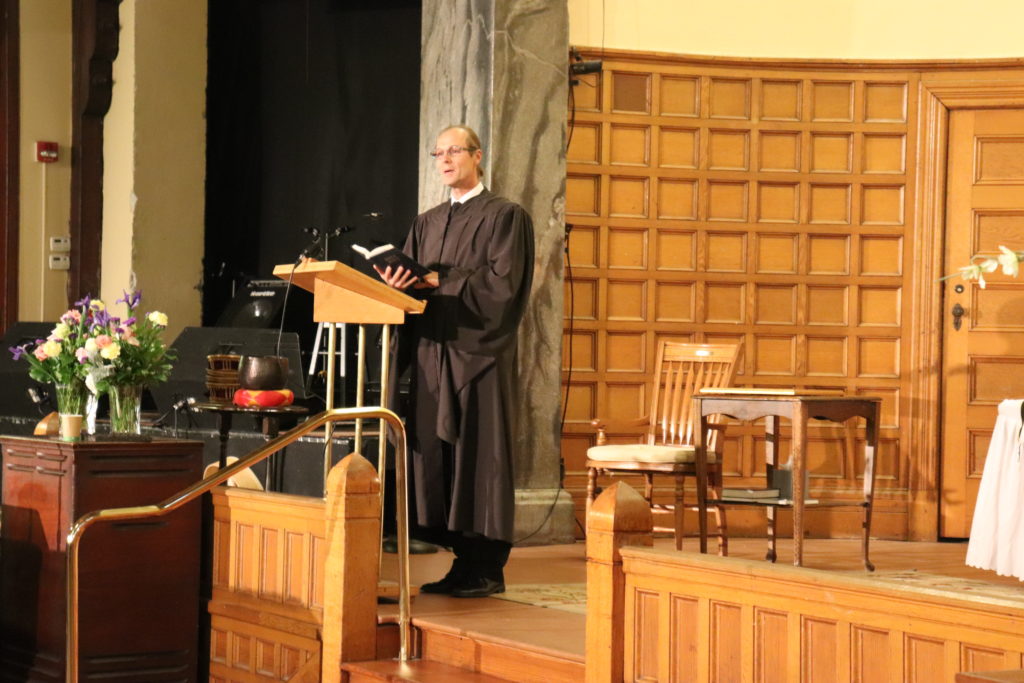Reflections From Lehel Molnár, 2018-19 Balázs Scholar
 My family and I arrived in the U.S. last year in mid-August. During this time, we’ve learned a lot at Starr King School for Ministry, Pacific School of Religion, and UC Berkeley (and of course our daughter at Martin Luther King Jr. Middle School).
My family and I arrived in the U.S. last year in mid-August. During this time, we’ve learned a lot at Starr King School for Ministry, Pacific School of Religion, and UC Berkeley (and of course our daughter at Martin Luther King Jr. Middle School).
As part of my coursework this year, I have been working on arranging the Wilbur Rare Book Library here at SKSM under the guidance of Rev. Dr. Jay Atkinson and Rev. Dr. Meg Richardson. I enjoy this work because I have worked more than 20 years as archivist of the Hungarian Unitarian Church at Kolozsvár, Transylvania. It has been a great opportunity to catalog about 1,143 books in the rare book collection. I have worked with great devotion at SKSM Archives and Library.
Alicia Forsey, a former professor at SKSM had already made a catalog (accessible online by author & by date of publication), but there are not full descriptions of the books and they are still very hard to find on the shelves. I have worked on identifying and adding numbers for each book. The Wilbur Rare Book Collection reflects the life work of Earl Morse Wilbur. But his life’s work, like most of ours, is something we can never say is done. In each generation, someone needs to pick up where each person before us left off. So I see myself in my work with the collection as taking up where Alicia Forsey left off.
The Wilbur Rare Book Library is a unique treasure. The books date back to the 16th century, and are in 8 different languages: Latin English, French, German, Polish, Dutch, Italian, and Hungarian. It is very important that the Rare Book Collection must be accessible for every scholar around the world. These books are not only valuable because they are old and they are mostly about Unitarianism, but also because there are a lot of owner notes that are important from a history point of view.
I found many old photos of famous Unitarians in the books. For example, I found a portrait of Arius that cannot be found on the Internet. I have never seen this picture of Arius before. I found a book written by Charles William Wendte, a former minister of First Unitarian Church of Oakland, about Starr King and published in 1921. Wendte recommended this particular book to his wife and that recommendation letter is still in the book. There are many such notes in the books.
Unfortunately, I cannot finish this work, but I really would like to come back to continue.
I learned so much from my professors here in the U.S., but I think that it is very important to be mention that I learned a lot from the regular people as well. We are still traveling a lot and we’ve met many different kinds of people. One of the most important things that I’ve learned while in the U.S. I read few days ago: “age does not matter unless you are a cheese.”
This sentence inspired me and I realized that age really doesn’t matter in America. It doesn’t matter if you’re young or old, you are important – not only to your family and to your friends – but also to the wider society. Age does not matter unless you are a cheese. The cheese is better with age and with age comes wisdom, so it does not matter if you are a cheese as well.
At home in Transylvania Romania, unfortunately age matters. Our society does not respect elders as much as they deserve. Many of them feel that they are useless to society and they are just waiting to die. We learned that everyone here is important. I think that in Transylvania, we have to work to teach everyone that age does not matter. Everyone is a creature of God.
We will be blessed if we can build many ladders to link us together, individually and communally regardless of age, gender, sexual orientation, religion, race and so on, but only if those ladders are not dusty and full of cobwebs from disuse, but neat and shiny from being used.